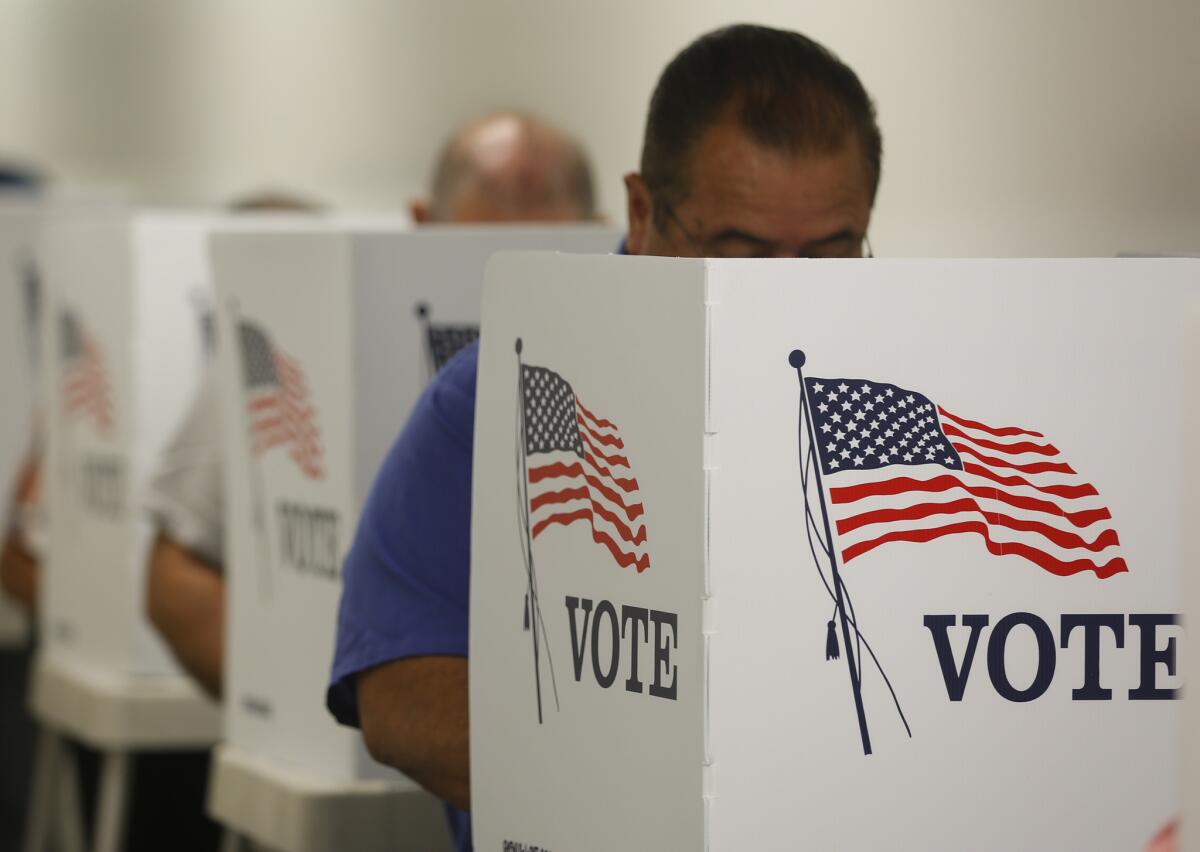Capitol Journal: Here’s why Gov. Brown should junk the presidential election bills on his desk

- Share via
Reporting from In Sacramento — Two presidential election bills are on Gov. Jerry Brown’s desk, sent to him by the Democratic Legislature. Both should be tossed in the trash.
No doubt I’m in the minority on this. These bills do offer some fun, even if they’re flawed.
One has strong pluses that are outweighed by unacceptable minuses.
The second is a mean-spirited “gotcha” bill aimed at the Democrats’ No. 1 enemy: President Trump. It may be satisfying politics, but it sets a risky precedent.
The first bill moves up California’s presidential primary from June to March. Great idea. But it also moves up the state primary along with it. A horrible idea.
The second measure would require all presidential candidates to release their tax returns for the last five years. Anyone who refused wouldn’t be allowed on the California ballot. That’s a sharp poke at Trump, who in 2016 was the first presidential candidate in 40 years not to release his taxes.
Yes, watching Trump squirm would be entertaining. And maybe the tax information would be useful for some voters. But even if the disclosure requirement were constitutional — and there’s substantial doubt about that — it’s a crummy precedent.
What would be next? A requirement that every candidate release a thorough health fitness report disclosing all past illnesses? Make the candidates pledge to campaign in California for at least 10 days? And how would red states retaliate? Force every candidate to disclose whether they’ve ever voted for a tax increase?
As for the presidential primary, it definitely should be moved up so our votes mean something in the nominating process. Of course, we’ve tried that in the past with minimum impact. Other states just yawned and moved up their primaries, too.
At one time — roughly half a century ago — California’s presidential primaries were huge deals. In 1964 and 1972 they actually decided nominations.
But they gradually became hollow shells. The nominations were sewed up long before in earlier contests elsewhere. Pipsqueak states got all the attention while we watched from the nosebleed seats.
Then for four presidential elections starting in 1996, California tried to become a player again by holding early primaries. Results were mixed. Finally, in 2012, we gave it up and fell back to June inconsequence.
Another stab at an early primary, however, does make some sense. It’s immaterial which candidates might be helped. It certainly would benefit contenders with lots of campaign money to spend in this gigantic state.
And it would benefit any California candidate, although there currently aren’t any promising prospects for 2020. Sorry, Sen. Kamala Harris and Mayor Eric Garcetti. Maybe later.
What’s most important for Californians is that they’d be voting in real time when the nominations were still up for grabs. We’d be participants rather than spectators.
The problem with this bill, SB 568, is that it also would move the state primary up to March — in every election year, regardless of whether there was a presidential contest. That would mean early voting in 100 legislative and 53 congressional races and maybe a U.S. Senate seat. And in nonpresidential years, there’d be an early primary for governor and other statewide offices.
They’d all have to start campaigning full bore the previous Halloween. Then, after the primary, there’d be an eight-month general election campaign. Spare us. Think voters hate politicians now? Wait until after all that spinning and demagoguery.
What’s needed is to keep the state primary in June. Opponents of that idea point to the added $100-million cost for a separate presidential primary. But the annual state budget totals $183 billion. Surely $25 million can be set aside each year for a timely presidential primary once every four years.
Opponents also contend that there’d be a low turnout in the June primary if voters had already cast ballots for president in March. Could be. So what?
Truth is, what Democrats fear is that a low June turnout would hurt their ballot propositions. Also, a March primary is an incumbent-protection plan for both parties because challengers would have less time to become known to voters.
So dump this bill. Pass another next year that provides for separate state and presidential primaries. Granted, that’s unlikely.
But the bill to force release of a presidential candidate’s tax returns, SB 149, is constitutionally dicey. The U.S. Constitution sets out two basic criteria for president: A candidate must be “a natural born citizen” and at least 35 years old.
The U.S. Supreme Court ruled in 1995 that states can’t add to the constitutional requirements for federal office. But the Supreme Court also has held that states can regulate ballots to keep them from being unwieldy. In California, the secretary of state qualifies anyone who is “a generally-recognized candidate.”
Adam Winkler, a UCLA constitutional law professor, says the 1995 court ruling “would likely mean that California cannot add additional qualifications” for a presidential candidacy.
Jessica Levinson, a Loyola Law School professor who heads the Los Angeles City Ethics Commission, says: “If this is viewed as a new qualification, then it’s unconstitutional. If it’s viewed as a procedural rule, it is constitutional. There are good arguments on both sides.”
Realistically, it’s a slap at Trump — and in nonlegal terms, a gratuitous new qualification especially concocted for him.
Brown should veto the bill — if for no other reason than he didn’t release his taxes either when running for governor in 2010 and 2014.
Follow @LATimesSkelton on Twitter
ALSO
As long as Trump is president, California lawmakers will keep building a wall against his policies
A good compromise will result in California becoming a ‘sanctuary state’
More to Read
Get the L.A. Times Politics newsletter
Deeply reported insights into legislation, politics and policy from Sacramento, Washington and beyond. In your inbox three times per week.
You may occasionally receive promotional content from the Los Angeles Times.











